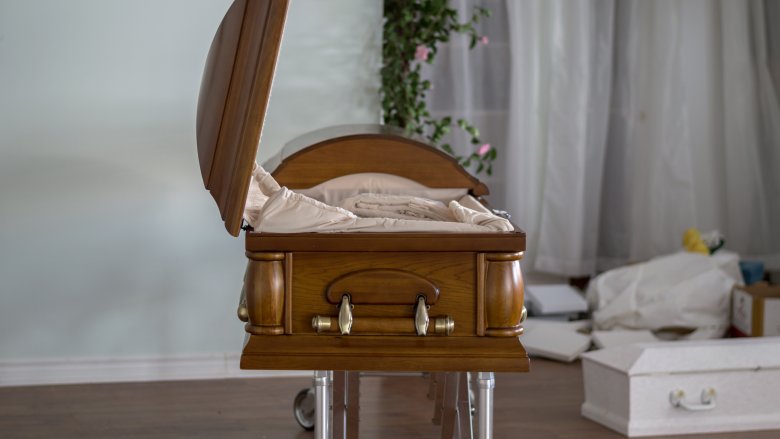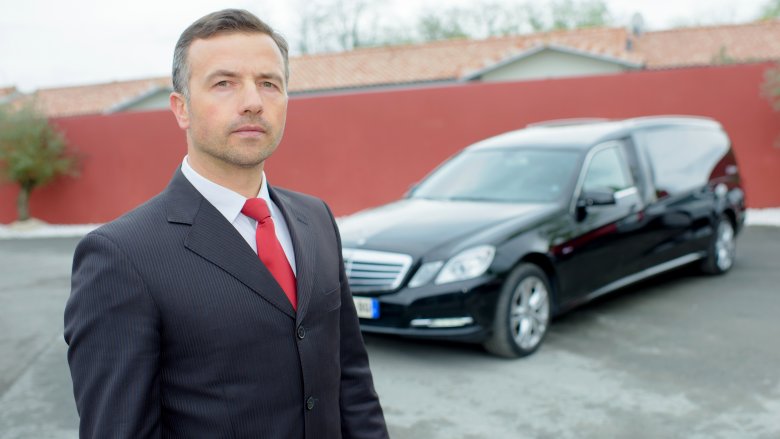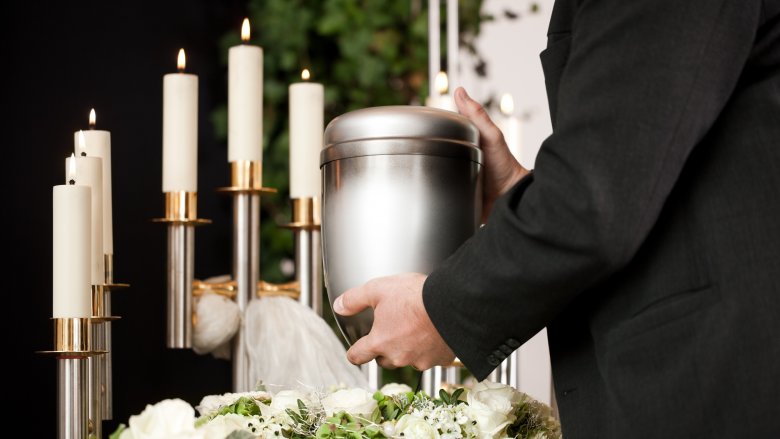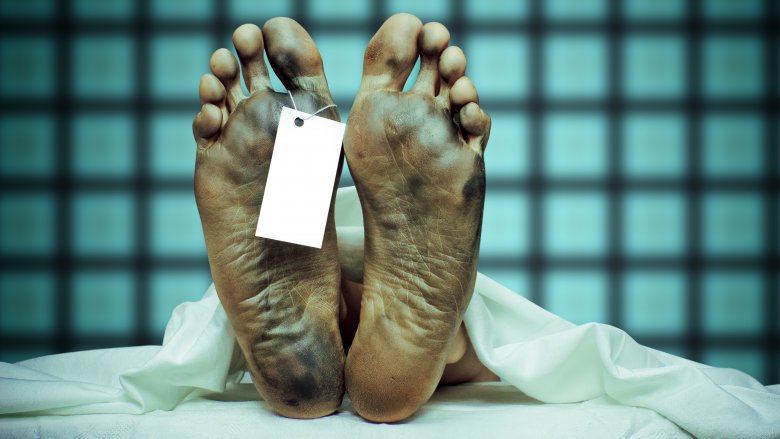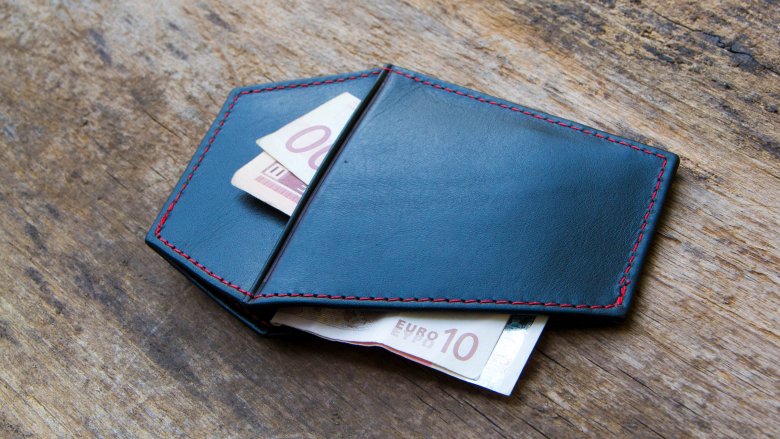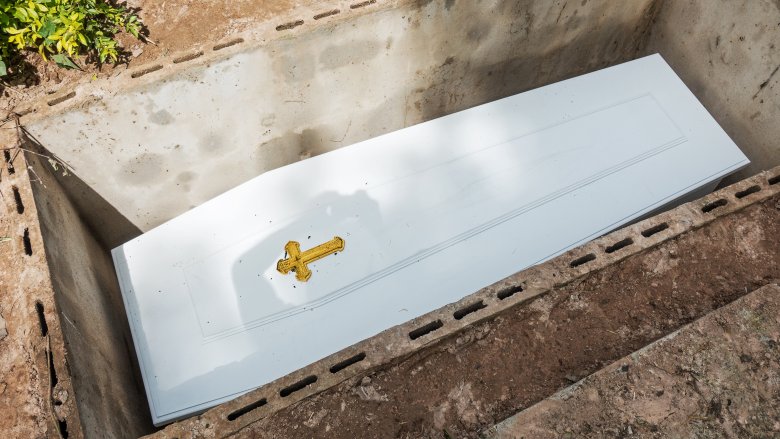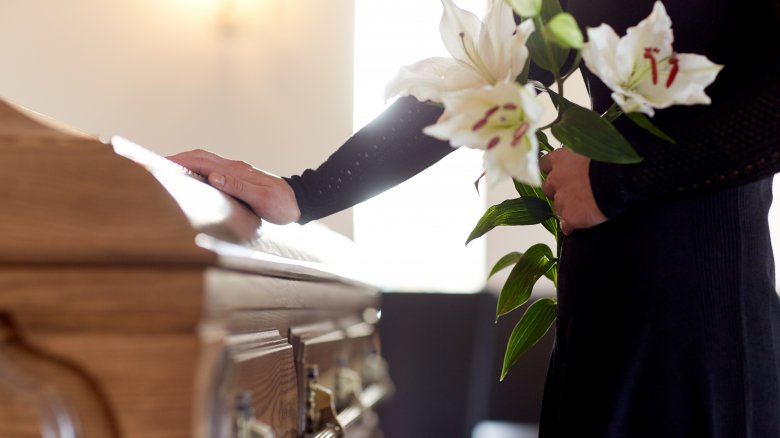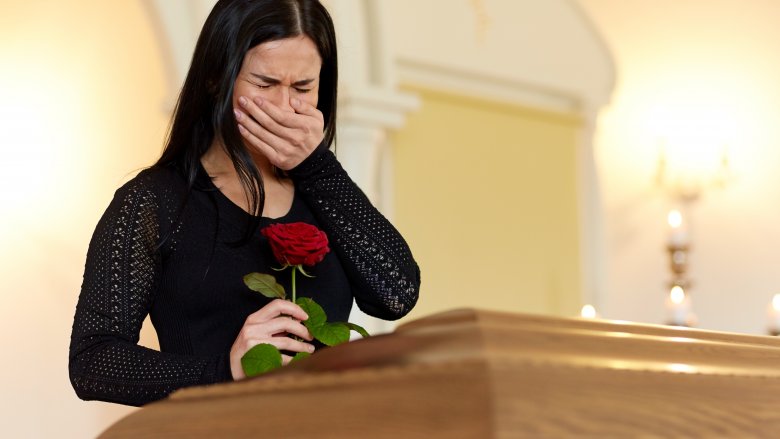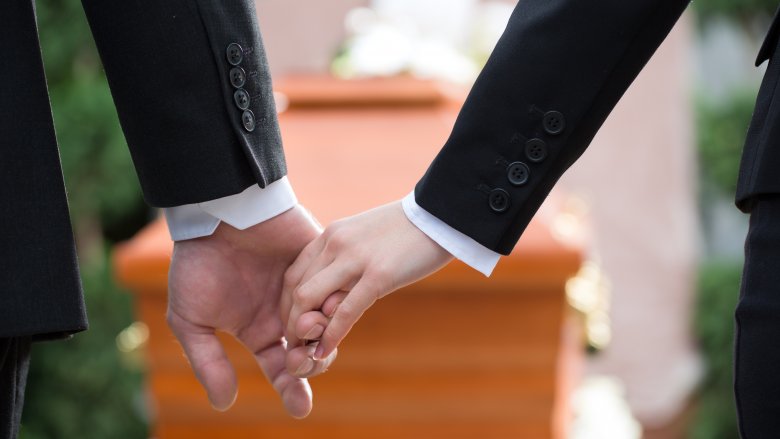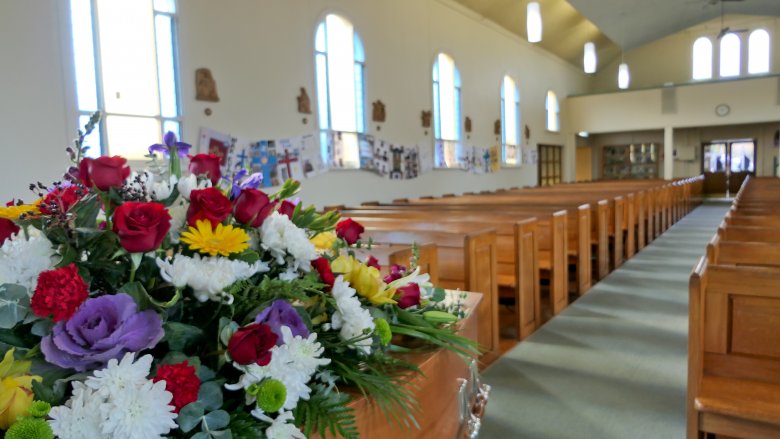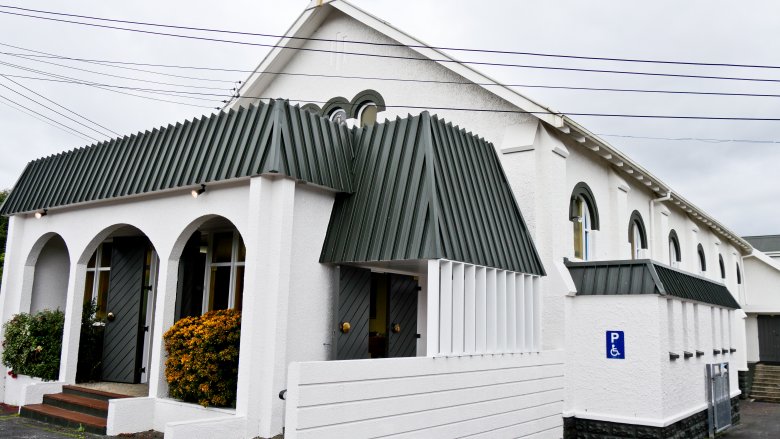False Things About Funeral Homes You've Been Believing
Funerals used to be a private family occasion, with little outside help. According to Funeral Source, women would clean and lay out a body in the nicest room of the house and then mourners would come into the "funeral parlor" to say goodbye.
This all changed during the Civil War. Suddenly, there were dead bodies everywhere and they needed to travel to get back home. The process of embalming became popular to keep the soldiers from decomposing and the people who did it went from being just undertakers to morticians. As the years went by they started taking their jobs more seriously and it became an actual profession.
By the 1890s the ceremony of death was taken out of private houses and into businesses. Funeral homes sprung up until there were almost 25,000 in the U.S. in 1920. But with all this success came misconceptions and stereotypes, some that you probably believe.
Funeral directing is a boy's club
If you picture a mortician, you probably have some stereotypes. The person is wearing a black suit, standing with head slightly bowed, hands clasped, looking dour. But regardless, the person wearing that suit is almost certainly a dude. There's something about death that just seems to imply that guys are in charge.
And until recently, that seemed to be true. Fortune interviewed a woman who started work at a funeral home in the late 1980s, and she said "men really doubted that women could handle it." People were always asking her boss how the "girls" were working out.
It turns out that "girls" are working out quite well. These days, 60 percent of mortuary students are women, according to the National Funeral Home Directors Association (via USA Today). And while some are joining their family businesses, most are just interested in having a meaningful job.
They say some things women can just do better, like bond with a woman who has lost her child, or even just understand why having the exact right flower arrangement is so important. Funeral directors say it's all about the emotional connection you make with people who are really sad. Women tend to be great at that, and it involves a lot of areas, like sociality and psychology, where they have dominated for years. It's just a slightly different way for ladies who are good at that stuff to shine.
Morticians are morbid
You would think a job that deals with death all the time would attract some weird and depressed people. Who else would want to do this kind of job?
It turns out, according to female funeral directors interviewed by The Globe and Mail, those stereotypes couldn't be further from the truth. One talks about the image of the dour funeral director you see in TV and movies. But she says that somber image couldn't be further from the truth, with funeral directors in her experience being really funny and warm. Another interviewee also talked about the humor involved. It makes sense, like the gallows humor soldiers are famous for, that when you work with death it would help to have a great sense of humor.
And what's the total opposite of being morbid? Doing a sexy calendar, obviously. This was the idea of some mortuary workers back in 2007. It showcased how you can care for the dead and still be a beefcake. It helped raise money for charity and according to its official website, it got international attention. People were so excited to see these normally suited guys take it (almost) all off that they did the calendar again in 2008.
The point is working with the deceased is the same as any other job and the people are just as varied. Sure, there are probably some not-so-cheery morticians, but in general they're as happy and funny as anyone else.
Funeral directors spend all day around dead bodies
Sure, we tend to concentrate on the "dead body" aspect of a mortician's job because, well, it's the ickiest. But in reality, being around human remains is only one part of a very complicated job.
Here are just a few of the things funeral directors do with their day, according to the Commonwealth Institute of Funeral Service. First, you have to deal with moving the body from wherever it is to the mortuary. Grieving families aren't exactly going to throw grandma in the back of their SUV, so you have to be on top of that. Then you have to consult with the family about what services they want. This is where both emotional intelligence and customer service come in handy, because the people you're dealing with may not be in the best headspace.
Once you figure out what they want, taking care of all the details is up to you, so it's important to know all about both the legal and religious institutions you're dealing with. Finally, you have to liaise with the cemetery if there will be a burial, and take care of all the legal documents. Then there are the totally random things that come up. Vice interviewed a funeral director who was called upon to help dig a grave himself. And yes, somewhere in between all of that it's important to make the body look pretty.
Morticians are in it for the money
Because funerals can be so expensive, people tend to think morticians are raking in the big bucks. There's also the fact that the only people they're making money from are grieving family members, so they can seem like heartless individuals in it for the green. Neither of these things is true.
First, most morticians don't actually make that much money. According to PayScale.com, the average salary is about $46,000. It can get as high as $70,000 but, it can also hit a low of about $25,000. According to one mortician who blogs on Confessions of a Funeral Director, the only people who make any real money are the people who own the funeral homes. But if you're just one of the people down in the trenches, "expect less than a nontenured public school teacher's salary."
And morticians aren't evil for asking for money. They're performing an important service and deserve to be paid for it. Sure, it sucks they have to ask grieving people to hand over the cash, but unless everyone starts paying for their funerals ahead of time, that won't be changing. An interview with a funeral director in the Queensland Times reveals their true nature: They do this because they have a vocation, and want to be there to help families in their times of need. People who just want to make money can find plenty of less emotionally demanding ways to do it.
You have to embalm the body
Everyone knows you have the option to be cremated if you want to, but if you are having an open casket and being put into the ground you have to get embalmed. Or do you? According to the Funeral Consumers Alliance, not only is there no law saying you have to be embalmed, the process itself is only common in the U.S. and Canada.
But isn't embalming safer for the environment and public health? Again, no. Not only has the U.S. Centers for Disease Control found it does no good, health-wise, the chemicals used are highly toxic.
So why do we embalm? Most people want their relatives to look as nice and lifelike as possible if they're going to have an open casket. But it isn't really for the dead person's benefit, but the people who have to look at them. No one wants to think death changes anything, including how you look, so it's a pleasant facade for the viewers who are still alive. In reality, the act of embalming is very physically invasive and kind of an icky thing to do to a body just to make people feel a little better. And it doesn't even slow down decomposition that much. If you dug up your uncle in a few years for the fun of it, don't expect him to still be looking fresh as a daisy.
Some religions like Muslim, Bahá'í, and orthodox Judaism straight-up prohibit embalming. And of course, some people get cremated and skip the question entirely.
Funerals are always going to break the budget
If someone in your family has just died, you probably have a lot on your mind. You're filled with grief and rushing to get them buried in a loving and dignified manner. You're probably not thinking about clipping coupons. But comparison shopping can save you a bundle.
Funerals don't have to be expensive, but the way most people do funerals means the price is up there, with the average being between $7,000 and $10,000, according to Parting.com. It makes sense because funerals are complex, and each part costs money. Everything from paying for digging the grave to embalming to the headstone costs cold hard cash, which not everyone has. Some people are even crowdfunding funerals these days.
But if you don't just take the first option you find, or use the funeral home your family always has, you can save serious cash. For example, CNBC says that the cost of cremation in New York City can vary from $550 to $10,125. That's for the same basic service. And since a law requires funeral homes to give you accurate prices over the phone, it's relatively easy to compare prices.
And why not think about this stuff before it's vital to know? People save for retirement, you can save for your funeral. It's much easier on your grieving relatives if everything is already prepared.
Funerals have to be sad
If you've ever been to a traditional funeral, you know what to expect: the disturbing open casket, everyone dressed in black, the huge flower arrangements trying to inject some color, the crying family, maybe a dour hymn or two, and the subdued speakers. Then there's the ceremony by the grave, which manages to be even more depressing. So it's not that surprising that people who have experienced this are not effusive when describing the experience.
According to a 2012 Funeral Foundation Study (as related by Cremation Solutions) literally no one came away positively impressed by funerals. Instead they described them as "suffocating, confining, cold, sterile, lifeless, and dark." People came away sad, instead of thinking of the good times with the deceased.
So it makes sense that the idea of funerals is changing. People who have gone to those depressing events don't want people leaving their sending-off feeling the same way. Instead, people are putting the "fun" in funerals, and they're having celebrations of life instead of concentrating on the whole dying bit. They see traditional funerals as erasing the person to concentrate on the ritual. So why not have some fun! Play some pop music. Have a wake and let the liquor flow. Do something fun that reminds you of the person you lost, but not the loss itself. Cremation Solutions says the goal of a funeral should be a transformation, and a good mortician will help you find that.
You have to wear black to a funeral
We're lucky to live in a time when mourning is less formal. Back in the old days you wouldn't be expected to wear black just for a day, but for a year in some cases. Heavy black dresses would be topped by a black veil to hide those unsightly tears –- don't want to disturb other people with your emotions, after all -– and you'd accessories with black hats, scarves, even umbrellas.
These days you get to wear mourning clothes to the funeral, and that's it. Even if you're the widow, people don't expect you to eschew color for months, and you can change into normal clothes when you get home. But Today says you don't need to stick to black, even at the most formal traditional funerals. They mention mauve, navy, and green as perfectly acceptable options, that can emit those mourning vibes just as effectively.
But they also talk about today's fun funerals. The ones that are even a bit wacky. In that case, you can wear pretty much whatever. Celebrations of life have fewer rules to follow. In some instances, you might even be asked to wear the deceased's favorite color or a fun Hawaiian shirt. In those cases showing up in head to toe black can be a distraction, and your goal should always be to not take away from the service or make it about yourself, no matter what style it takes.
You have to have a funeral
For some people, when you're born there's a ceremony like the bris or christening. When you get married, there's often another ceremony. So surely, when you complete the big three and kick the bucket, you must have to have another ceremony to round everything out. And most people do. But should more of us consider skipping the funeral altogether when we pop our clogs?
According to the Independent it's called "direct cremation." This means your body is taken from wherever you die to a crematorium, where it's taken care of, and your ashes either kept by the family or scattered without ceremony. It has a lot of benefits over a funeral. For one, it's a lot cheaper. Two, it's better for the environment that burial. And it also keeps people's memories of you while you were alive, rather than part of a death ceremony.
And it's not like people can't say goodbye in their own way. A moment of quiet reflection may be just as effective as a morbid church service. While this isn't popular right now, with only about 2,000 people in England and Wales opting for it every year, it does have at least one famous proponent. David Bowie himself opted for direct cremation, and millions of people around the world were perfectly capable of honoring his legacy in their own way when he died. So it might be something worth considering for your own ending.
Funeral homes are a mom and pop business
Maybe you spent your whole life supporting small, locally owned and operated businesses and you want to continue that right up to and including your death. So you told your next of kin only to deal with Mom and Pop's Little Funeral Home when you kick the bucket. But the joke could be on you: Unless you did your research, that seemingly family-run place could actually be part of a corporate conglomerate.
Originally, most funeral homes were owned by an individual or family and it was common for them to be passed on to the children. USA Today talked to two sisters who are going to take over their family funeral home when the time comes, and whose first memories are watching their mom make bodies look nice for viewings. And these days the majority of mortuaries and cemeteries are still owned in this fashion.
But in the 1960s, things started changing. The corporate world decided there was money to be made in owning funeral homes. According to FuneralWise, these days as many as 30 percent of funeral businesses are owned by just six companies — not that you'll be able to tell that easily. Because it's such a personal business, corporations tend to keep the small-time look and name. They might even keep on the employees. But they make changes in the "back office" and are all about the profits. Double check before you kick the bucket that you're keeping it local.
